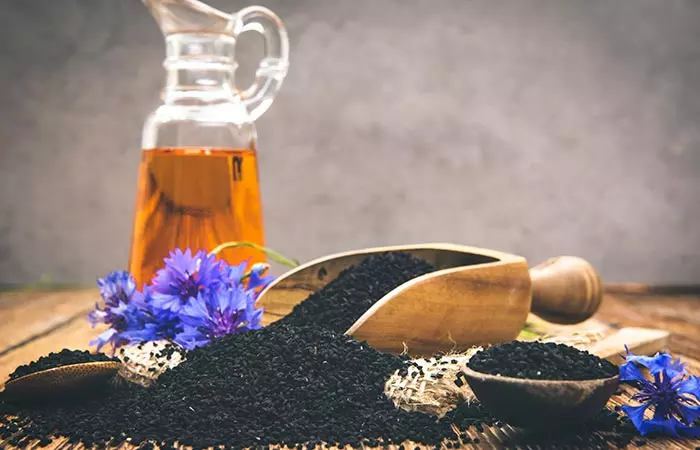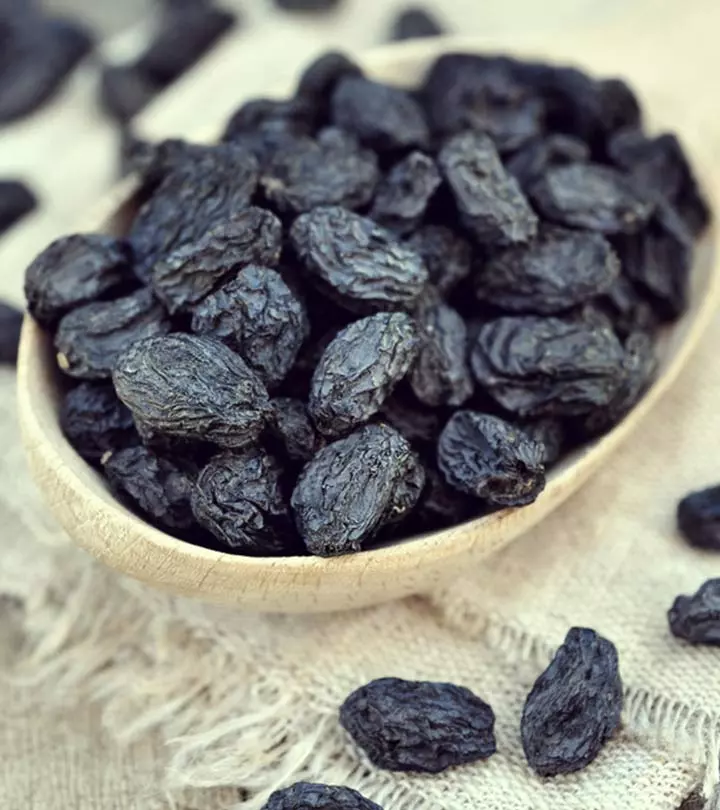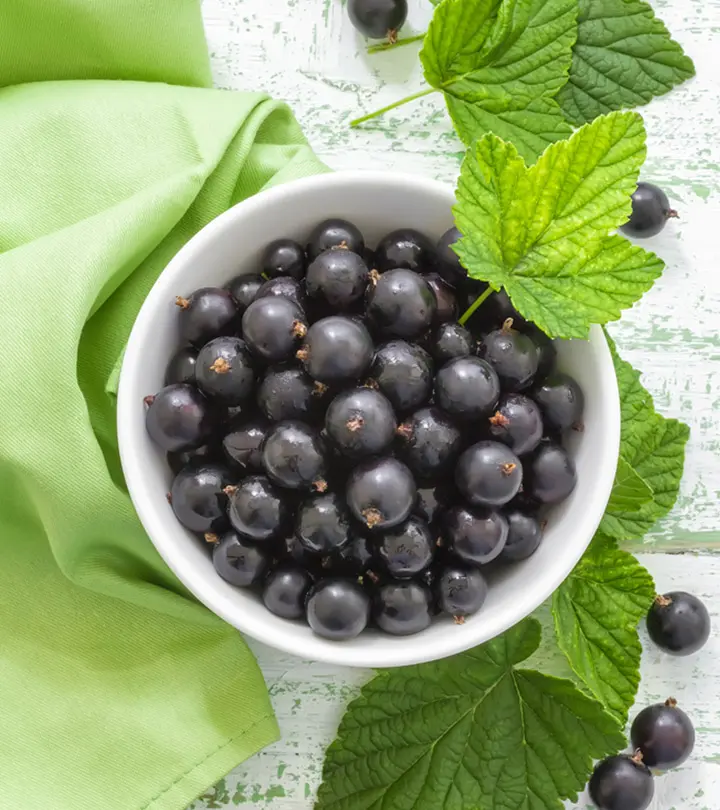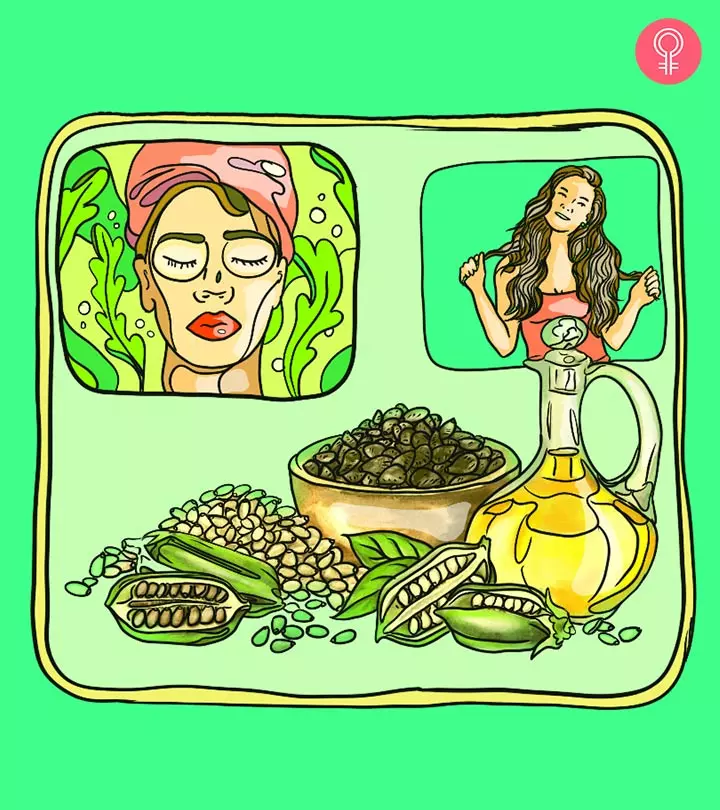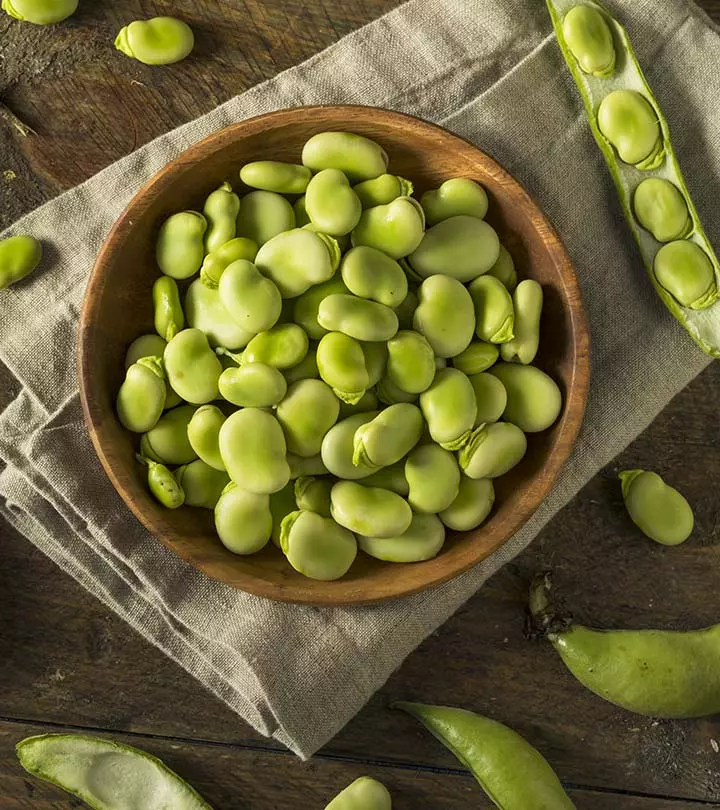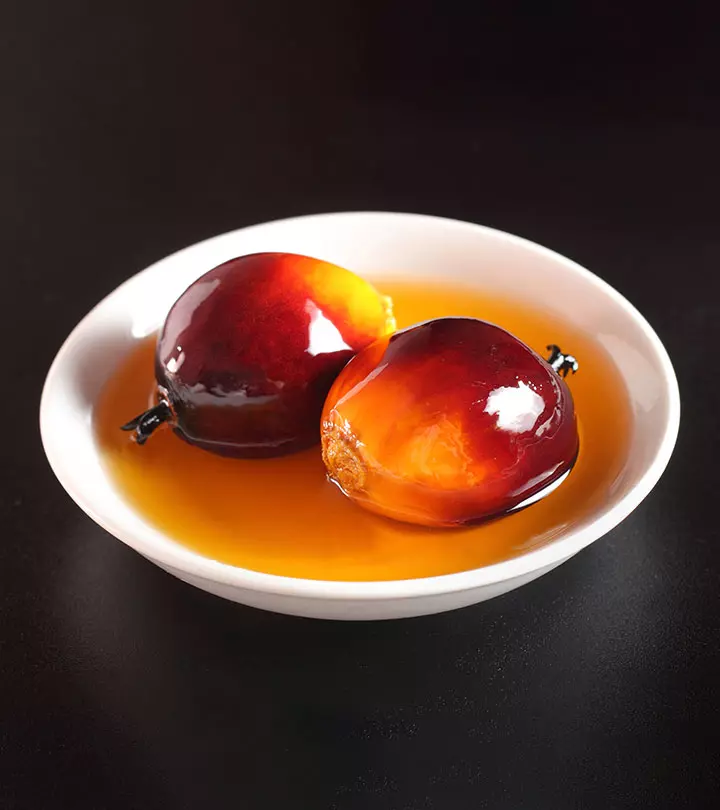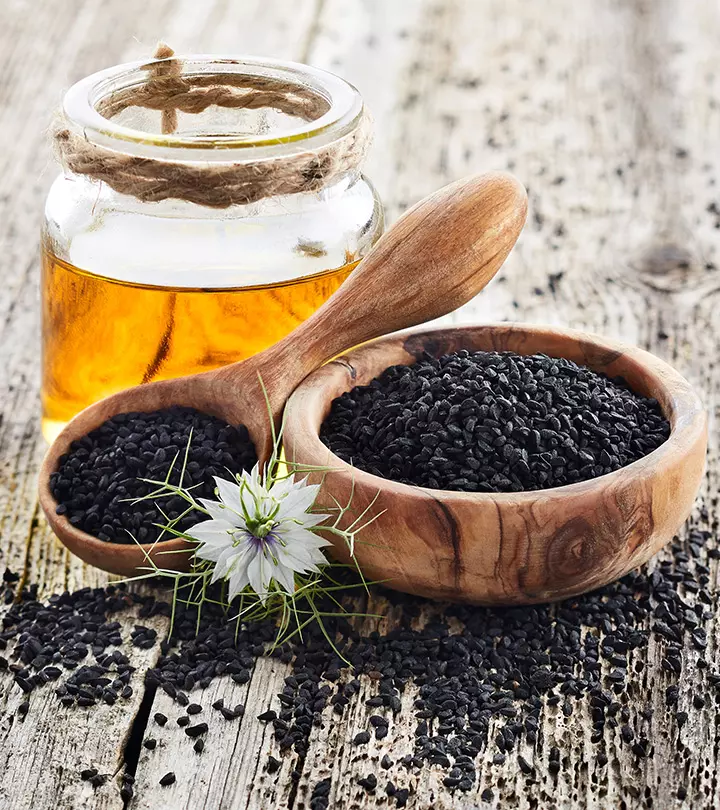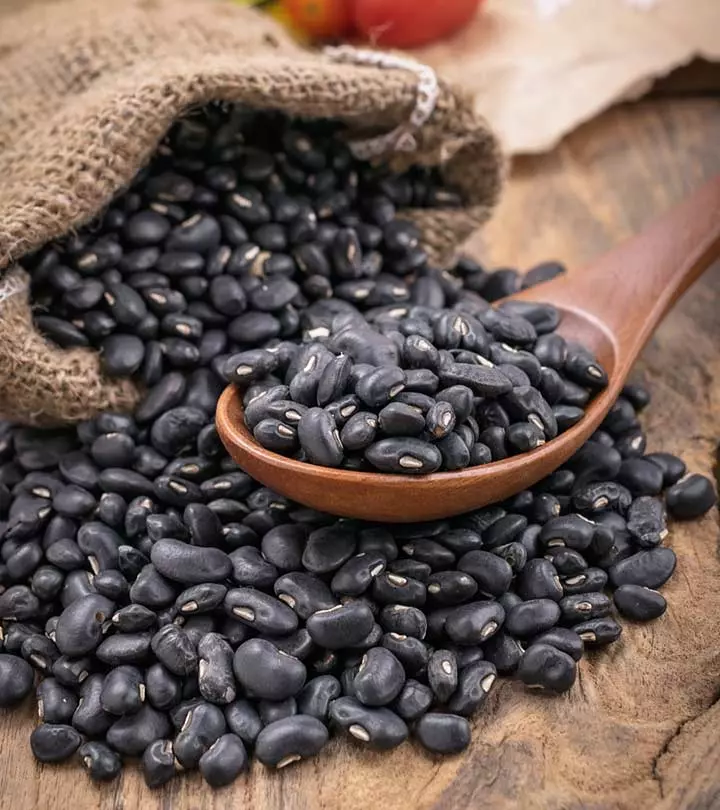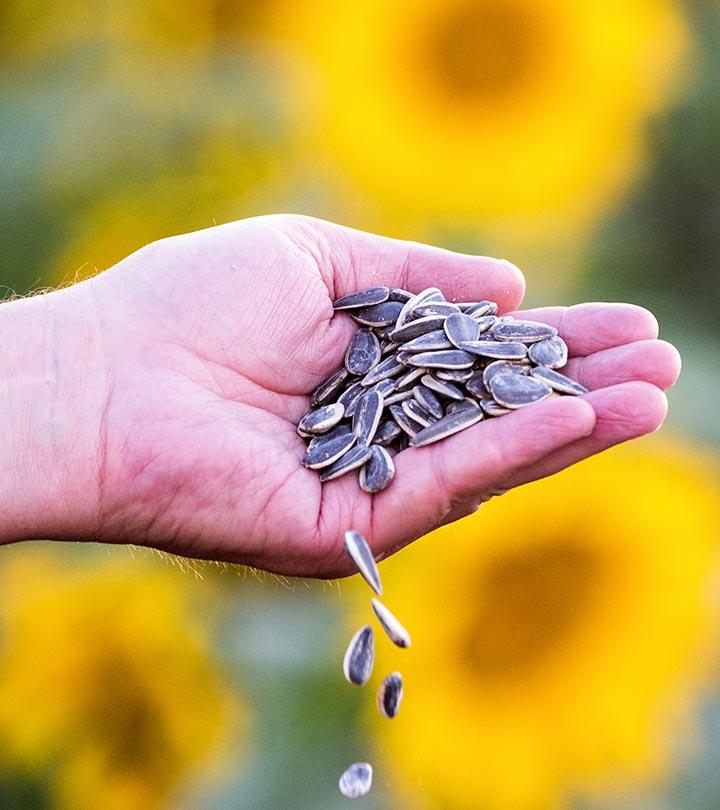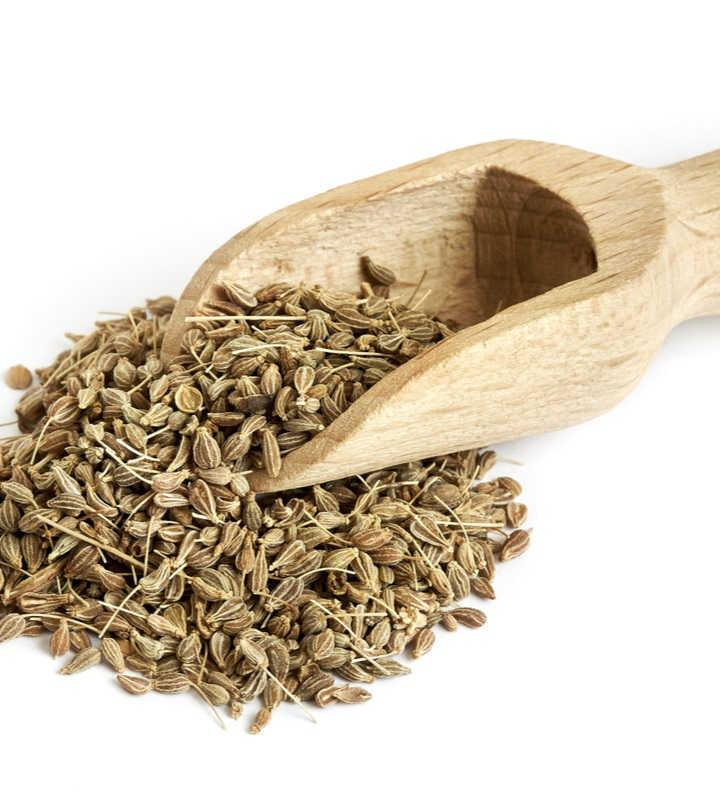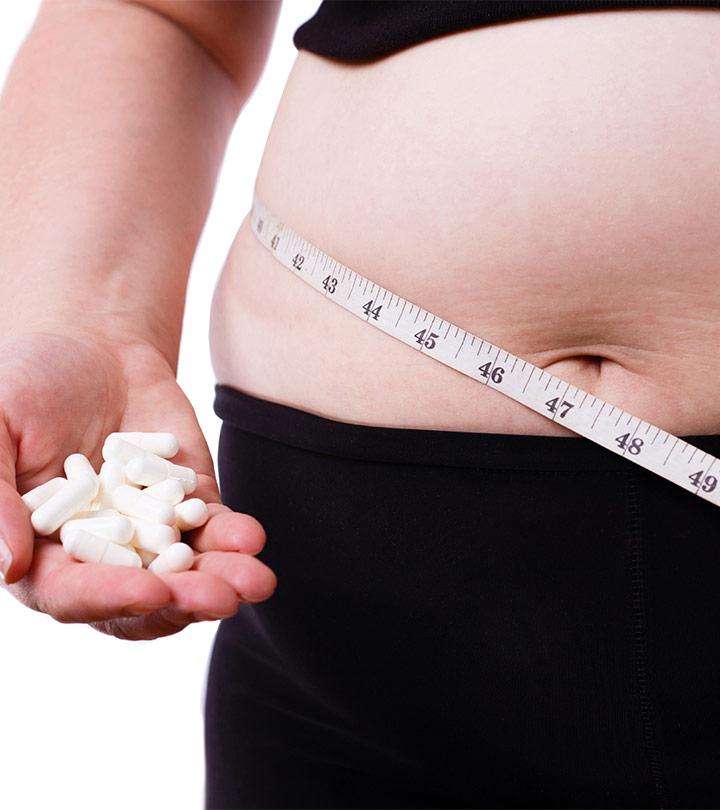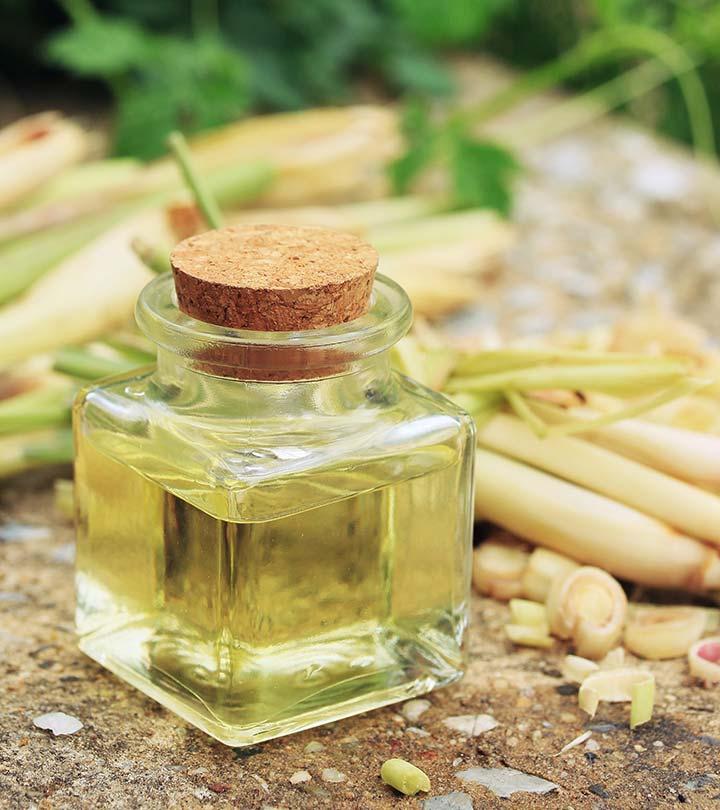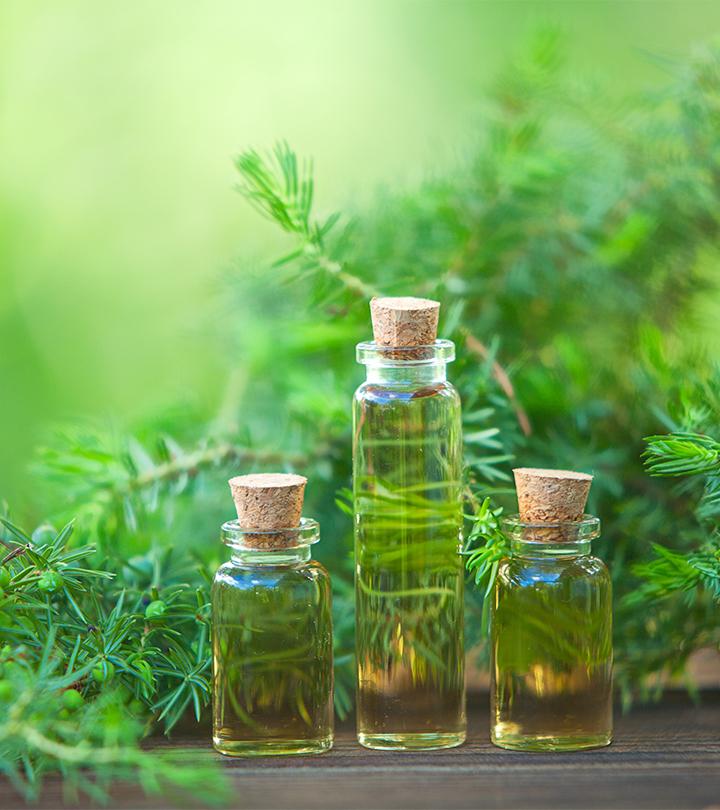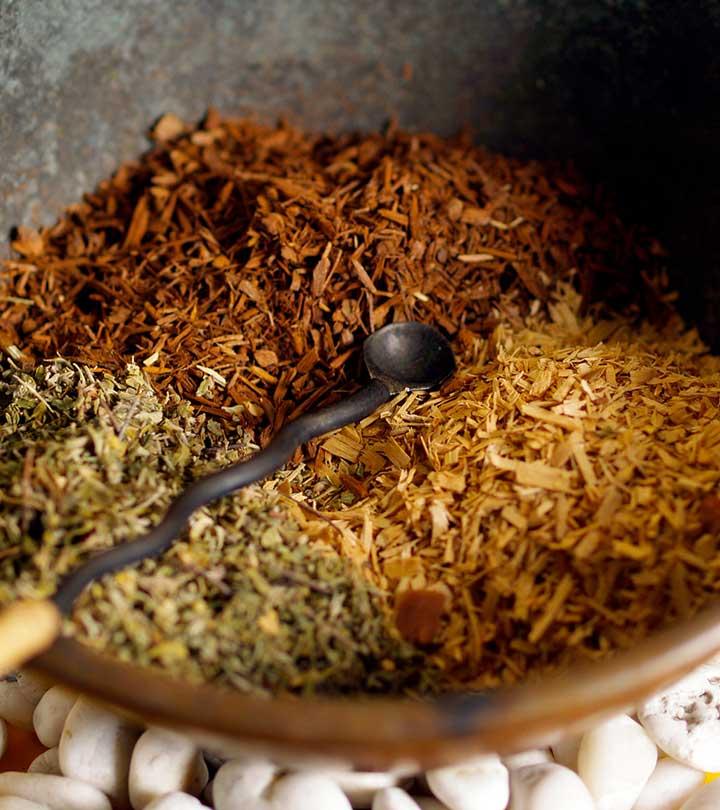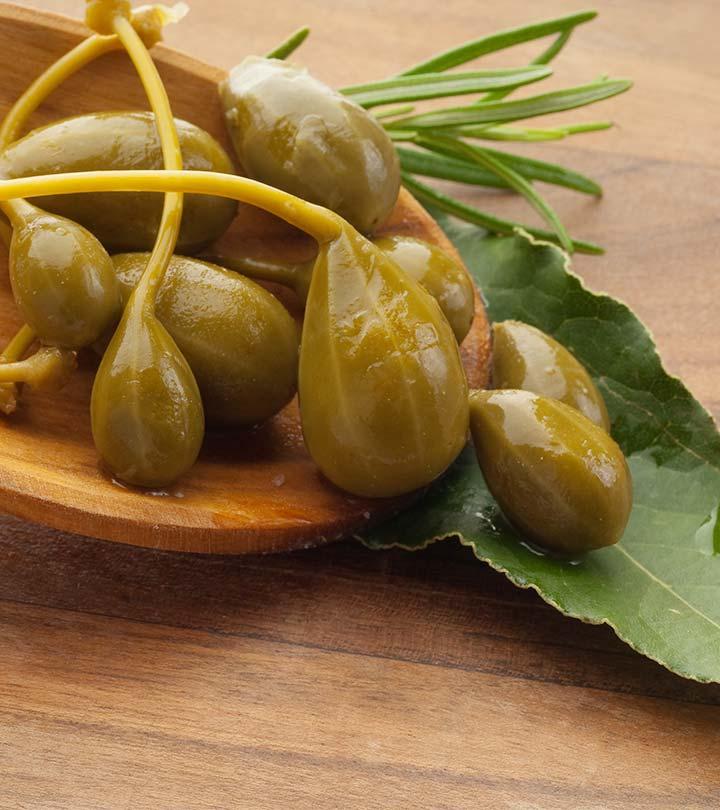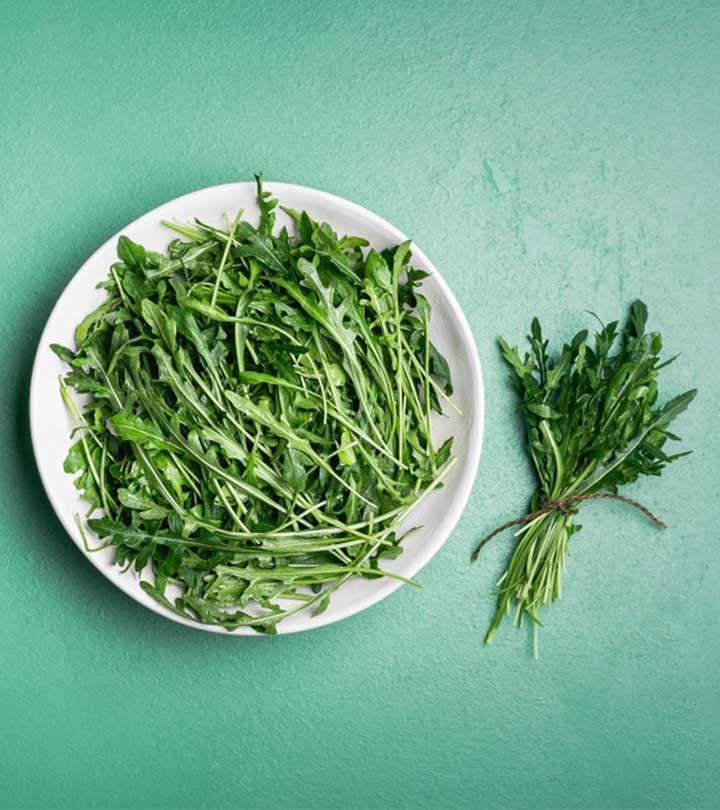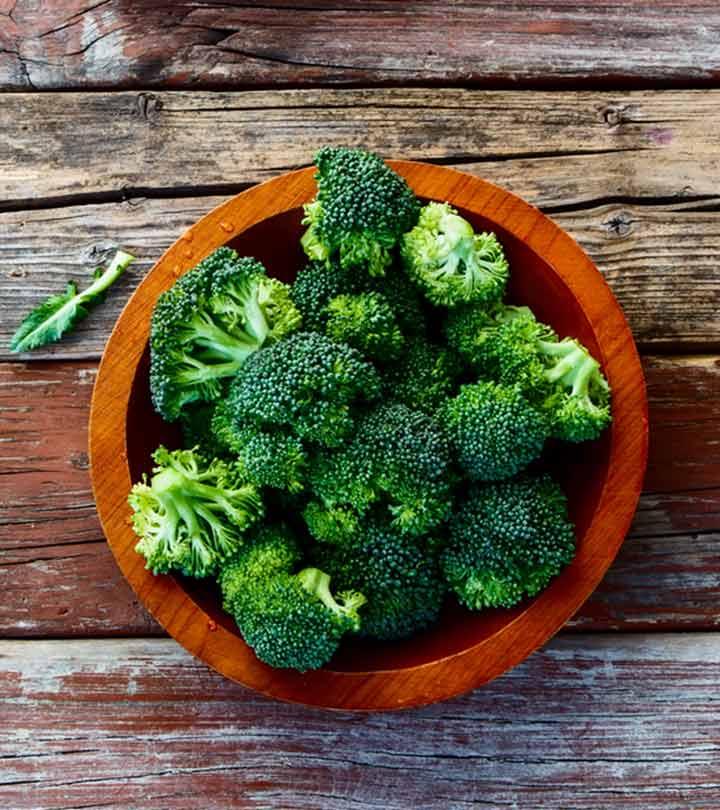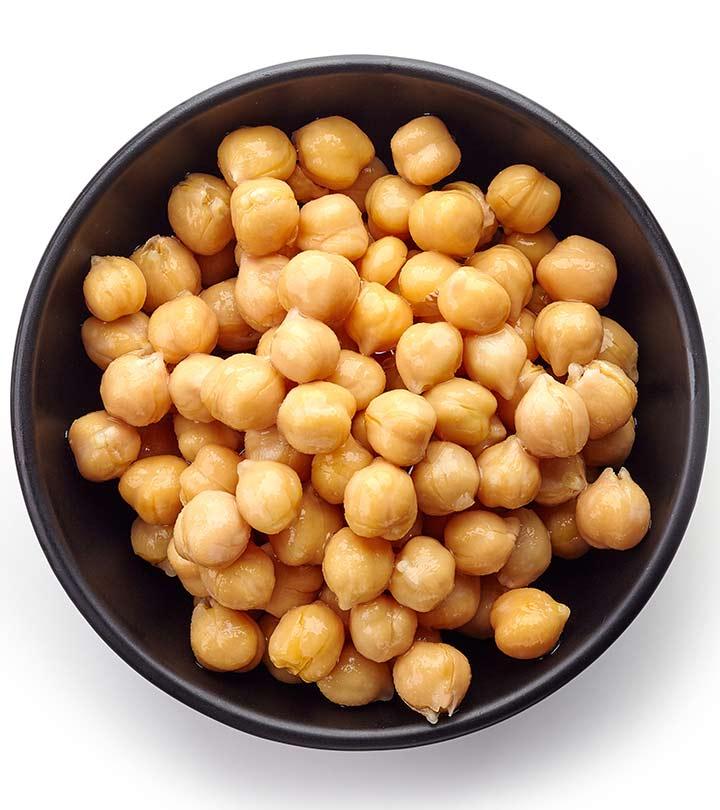10 Powerful Benefits Of Nigella Seeds Backed By Science
These ancient seeds have been used for centuries for their many medicinal properties.
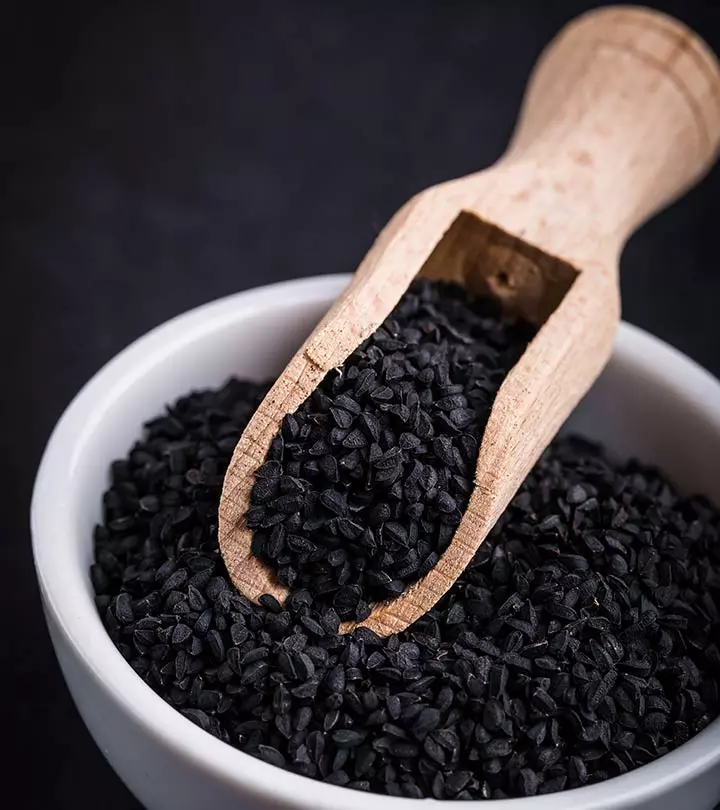
Image: Shutterstock
The benefits of nigella seeds will sway you to choose them over your regular cumin seeds. This condiment is also known as black cumin seed or simply black seed.
These seeds are packed with beneficial compounds that give them aromatic, purgative, stimulating, diuretic, expectoranti A substance that helps loosen and clear the mucus from the respiratory tract and relieves cough. , carminativei A substance that helps to relieve gas from the stomach or intestines and reduce abdominal pain. , and sedative properties. Nigella seeds (Nigella sativa) contain thymoquinone, a compound with many therapeutic uses (1). There are several health benefits of this condiment other than its unique flavor. This article discusses the benefits of nigella seeds, how to use them for maximum benefits, and any potential side effects this spice may produce. Take a look.
 Know Your Ingredient: Nigella Seeds
Know Your Ingredient: Nigella SeedsWhat Is It?
A black seed taken from the Nigella sativa plant that has a slightly bitter and smoky taste.
What Are Its Benefits?
It lowers cholesterol levels, aids in weight loss, maintains blood pressure, and reduces inflammation.
Who Can Consume It?
Anyone can consume this except people on diabetes, sedative, and blood pressure medications.
How Often?
You can consume 1 to 3 grams daily.
Caution
Avoid consuming nigella seeds if you are pregnant or have a bleeding disorder. Excess consumption may cause vomiting, stomach upset, or blisters.
In This Article
What Makes Nigella Seeds So Good?
Thymoquinone – an active ingredient in nigella seeds.
Researchers have been investigating thymoquinone since the 1960s, and it is known for its powerful antioxidant, anticancer, and anti-inflammatory properties (2).
Other active ingredients in nigella seeds, thymol and thymohydroquinone, possess antimicrobial and anti-tumor properties (3). The seeds have been used in Middle Eastern traditional medicine for over 2,000 years. The properties of these seeds are many – they are used as an aromatic, diuretic, expectorant, purgative, stimulant, carminative, and sedative (4).
Nigella seeds also have a place in Arabic folk medicine as a potent treatment for many diseases – some of which include jaundice, skin ailments, gastrointestinal issues, rheumatismi A medical disorder that results in stiffness and soreness in the body's joints and muscles. , asthma, bronchitisi A respiratory tract infection that affects the airways within the lungs, causing coughing, congestion, etc. , and even fever (4).
 Trivia
TriviaThere are a host of health issues the seeds help you deal with. In other words, it is unbelievable (almost) how much these seeds can do for you.
What Are The Benefits Of Nigella Seeds?
1. Help Lower Cholesterol Levels
Nigella seeds can have a significant impact on plasma lipid concentrations, thereby lowering total cholesterol levels. The seeds can also lower triglyceride1 levels (5).
Studies conducted on hypercholesterolemic2 rats revealed similar findings – nigella seeds could improve the rats’ antioxidant capacity, thereby helping lower overall cholesterol levels (6).
Studies on central obese men showed promise in the use of nigella seeds for reducing total cholesterol levels. A larger dose of the seeds and a longer consumption might offer much better results (7).
Thymoquinone had also helped combat oxidative stress in type 2 diabetes patients (8).
2. May Aid Weight Loss
Supplementation with nigella could produce a moderate reduction in body weight. This culinary condiment also improved BMI values and reduced waist circumference (9). Though high-quality studies are limited, and more research is warranted, this is an encouraging step. Also, use of the seeds hadn’t resulted in any side effects. So, using the seeds for weight loss should do no harm.
Studies also indicate that nigella can help prevent heart disease, diabetes, and cancer – which are ailments whose risk increases with obesity. Though it may appear safe to assume that nigella can benefit weight loss, more research in this regard can be beneficial (10).
3. Offer Protection From Cancer
The volatile oil from nigella seeds had significantly reduced the sizes and incidences of tumors in the lungs and colon of male Wistar rats3 (11). A growing body of evidence highlights the anticancer properties of nigella seeds (12).
In yet another study, nigella seeds were found to induce apoptotic4 cancer cell death in human colorectal cancer cells. This effect, as per the study, can be attributed to the thymoquinone in nigella seeds (13).
Nigella seeds were also found to prevent cancers of the breast, liver, skin, prostate, and cervix (14). The protective effects of the seeds against cancer can be attributed to their ability to suppress inflammation and exert immune-boosting effects (15).
4. Nigella Seeds Regulate Blood Sugar Levels
Intake of 2 grams of nigella seeds per day might help regulate blood sugar levels in diabetes patients (16). The seeds, at the mentioned dosage, had resulted in significant reductions in fasting blood glucose levels.
An Iranian study had also shown the beneficial effects of nigella seeds on glucose homeostasis5 (17). Though present findings support the use of nigella seeds in managing diabetes complications, further research is necessary.
In another study, nigella seeds reduced the levels of glycosylated hemoglobin6 (18). Elevated glycosylated hemoglobin levels were shown to increase the risk of atrial fibrillation7 in patients with diabetes (19). The seeds can cut this risk in patients.
5. Help Maintain Blood Pressure
Regular use of nigella seed extract may lower blood pressure in patients with mild hypertension, as per a study (20). Extracts of the seeds had lowered both systolic and diastolic blood pressure readings.
Even the oil of the seeds can help in this regard. Thymoquinone and thymol in the seeds can contribute to their blood pressure-lowering activity. The compounds work by reducing cardiac oxidative stress and the activity of angiotensin-converting enzyme8 (ACE), both of which help lower blood pressure levels (21).
The anti-hypertensive properties of nigella seeds can also be attributed to their diuretici A substance or agent that enhances urine production and flow and makes the kidney flush out excess sodium and toxins. effect (22). Rats treated with the seeds had shown a 4% decrease in their arterial blood pressure.
6. Can Fight Inflammation
In an American study, nigella seeds were found to fight inflammation in pancreatic cancer cells. Thymoquinone in the seeds could inhibit the effects of proinflammatory cytokines9, acting as a promising treatment for inflammation (23).
The anti-inflammatory activity of nigella seeds can also be attributed to their antioxidant properties. In studies, the antioxidant properties of the seeds helped reduce serum and tissue inflammatory markers and other inflammatory ailments like cardiac fibrosis10 (24).
Topical application of nigella seed oil was also found to relieve pain in patients with knee osteoarthritisi A chronic condition in which the tissues in the joint degrade over time, causing pain in the hip, knee, and other joints. (25). The oil was deemed more potent than acetaminophen, an analgesic drug typically used to treat arthritis pain.
In rat models, thymoquinone in nigella seeds had reduced rheumatoid arthritis pain – thanks to its anti-inflammatory properties (26).
7. Boost Immunity
Studies conducted on crossbred hens showed that supplementation with nigella seeds might boost immunity against Newcastle disease virus (27). Though we also need to look at specific human studies, this is an encouraging sign.
In yet another UK study, nigella seed oil supplementation was found to improve asthma control and enhance pulmonary function (28).
The seeds also possess powerful antibacterial and antimicrobial properties. They showed antibacterial activity against a harmful strain of bacteria called MRSA (29).
Nigella seed extract had also shown an antimicrobial effect against staphylococcal skin infection (30).
8. Promote Health Of Liver And Kidneys
The antioxidant properties of nigella seeds play a role in protecting the liver. These can fight the oxidative stress that may harm the liver. The thymoquinone in the seeds also fights free radicals and cuts the risk of them attacking human DNA – and possibly, the liver (31).
These antioxidant properties of thymoquinone are also responsible for protecting the liver from parasitic injury. Ingestion of the seed oil reduced the number of Schistosoma mansoni worms in the liver and even cut down the total number of ova present in both the liver and the intestine (32).
An Iranian study showed that nigella seeds could help cure kidney diseases, including nephrolithiasis (kidney stones) and kidney damage (33). Oral intake of nigella seed extract had significantly reduced the formation of calcium oxalate deposits.
9. Nigella Seeds Treat Infertility
An increase in free radicals in the body system can affect sperm quality. The antioxidant prowess of nigella seeds can help avert this. Studies suggest the thymoquinone in nigella seeds can improve male fertility parameters by enhancing antioxidant defense (34).
Studies show that nigella seeds can be used as a single agent to treat male infertility (35).
An Iranian study concludes that intake of 5 mL of nigella seed oil every day for two months can improve semen quality in infertile men, and that too, with no side effects (36).
10. Treat Skin Ailments
Extracts of nigella seeds were found to exhibit antipsoriatic activityi A substance that has the potential to reduce the symptoms of psoriasis or prevent the condition. . Use of the extracts had shown significant epidermal improvement. Topical application of the oil had also aided the treatment of acne vulgaris (37).
The thymoquinone in the seeds also had shown antifungal activity (38). It can help in the treatment of fungal skin infections like candida.
Apart from the above-mentioned benefits, nigella seeds are often used as an ingredient in hair masks to increase hair growth and improve hair texture and shine (39).
Janina, a blogger, shares some of the benefits she experienced after using black seed oil, which is extracted from nigella seeds: “After using it in topical application faithfully, twice per day, my skin cleared up completely, and the texture, radiance and smoothness of my skin have been visibly improved (i).”
These are the powerful ways nigella seeds can make your life better. As you saw, there’s a ton of research backing it up. The seeds can treat most major ailments without side effects. However, to maximize these advantages, proper storage is essential. Know how to store them in the next section.
How To Store Nigella Seeds
- Before storing, make sure that the nigella seeds are dry. Moisture can spoil them.
- Place the seeds in airtight containers like glass jars or sealed plastic bottles, as air and humidity may reduce the shelf life.
- Store the jar in a cool, dark, and dry place, like your kitchen pantry or a cabinet. Avoid direct sunlight and heat exposure, which can affect the flavor of the seeds.
- Check the seeds regularly for any signs of spoilage. Replace them if you notice any damage or unpleasant odor.
- When stored properly, nigella seeds can remain fresh for a year.
Knowing how to store nigella seeds helps retain their freshness and keeps them ready for consumption. There are plenty of ways to include them in your regular diet. Find out in the next section.
 Trivia
TriviaBut how do you consume them? How do you include them in your regular diet?
How To Consume Nigella Seeds
Including the seeds in your diet is easy.
- You can coat little cubes of tuna with olive oil and sprinkle nigella seeds on them. This makes for a great appetizer.
- Mix whole nigella seeds with feta cheese, yogurt, and lemon juice – and use it as a condiment for your dishes.
- You can sprinkle the seeds on your morning breakfast or evening meal.
Quite simple, right? But hold on – nigella seeds are not for everybody. There are certain considerations.
What Are The Side Effects Of Nigella Seeds?
- Possible Issues During Pregnancy
The seeds are traditionally believed to stop the uterus from contracting, which can be a problem during pregnancy (40). Ensure you keep the consumption to normal food amounts. Please check with your doctor.
- Can Cause Bleeding Disorders
Thymoquinone in nigella seeds can slow down blood clotting (extend blood coagulation time) (41). This can aggravate bleeding disorders. If you have any bleeding disorders, please avoid the seeds.
This properly of nigella seeds can be a concern during surgery. Avoid intake at least two weeks before and after surgery.
- May Lower Blood Sugar And/Or Blood Pressure Levels Way Too Much
As the seeds can lower blood sugar and blood pressure levels, people already on these medications must exercise caution. Please check with your doctor.
Glossary
- triglycerides – the stored fat in your body, excess of which can be dangerous
- hypercholesterolemic – a state of excess blood cholesterol levels
- Wistar rats – albino rats specifically bred for laboratory purposes
- apoptotic – a type of cell death characterized by a series of molecular steps
- glucose homeostasis – a process denoting the balance of insulin and glucagon to maintain optimum blood glucose levels
- glycosylated hemoglobin – a form of hemoglobin that is bound to glucose in the blood
- atrial fibrillation – irregular and rapid heartbeat, often leading to poor blood flow
- angiotensin-converting enzyme – an enzyme that produces angiotensin II, a protein that elevates blood pressure levels; by reducing the activity of ACE, the seeds reduce the production of angiotensin II, thereby lowering blood pressure
- proinflammatory cytokines – a type of molecule excreted from immune cells that promote inflammation
- cardiac fibrosis – abnormal thickening of the heart valves
Infographic: Most Amazing Health Benefits of Nigella Seeds
Nigella seeds or black cumin seeds are currently gaining popularity because of their mind-blowing health benefits as well as their aromatic and sedative properties. There are a number of reasons why you should add nigella seeds to your grocery list right now — they aid in reducing body weight, blood sugar levels, and much more.
Check out the infographic below for more information.

Illustration: StyleCraze Design Team
Nigella seeds are also known as black cumin, and they have many therapeutic values. The benefits of nigella can be attributed to their active compounds. They also exhibit anti-inflammatory, antioxidant, and anticancer properties. This herbal remedy may help lower cholesterol levels, aid in weight loss, promote better digestion, protect against cancer, regulate blood sugar levels, and lower blood pressure. However, these seeds are not suitable for everyone, and their excess consumption may cause issues during pregnancy, slow down blood clotting, and lower blood pressure levels way too much. Hence, limit their consumption and consult your doctor in any emergencies.
Frequently Asked Questions
Can you eat raw nigella seeds?
Yes, nigella seeds can be consumed raw. However, dry roasting them will enhance their aroma.
Are nigella seeds poisonous?
No, nigella seeds are not poisonous. They are edible and offer an array of health benefits when consumed regularly.
Why are they called nigella seeds?
Nigella seeds are named for their color. ‘Nigellus’ means ‘black’ in Latin, hence the name nigella seeds.
Can I take black seed oil with honey?
Yes, black seed oil can be taken with honey. This combination is known to improve immunity and promote detoxification.
Key Takeaways
- Nigella seeds are used as a natural remedy for digestive, skin, and respiratory problems.
- The antimicrobial property of the seed may help manage Newcastle disease and a strain of bacteria called MRSA.
- These seeds have antioxidant properties that protect the liver from oxidative stress and fight free radicals.
- The antioxidant properties aid male fertility by improving sperm virility.
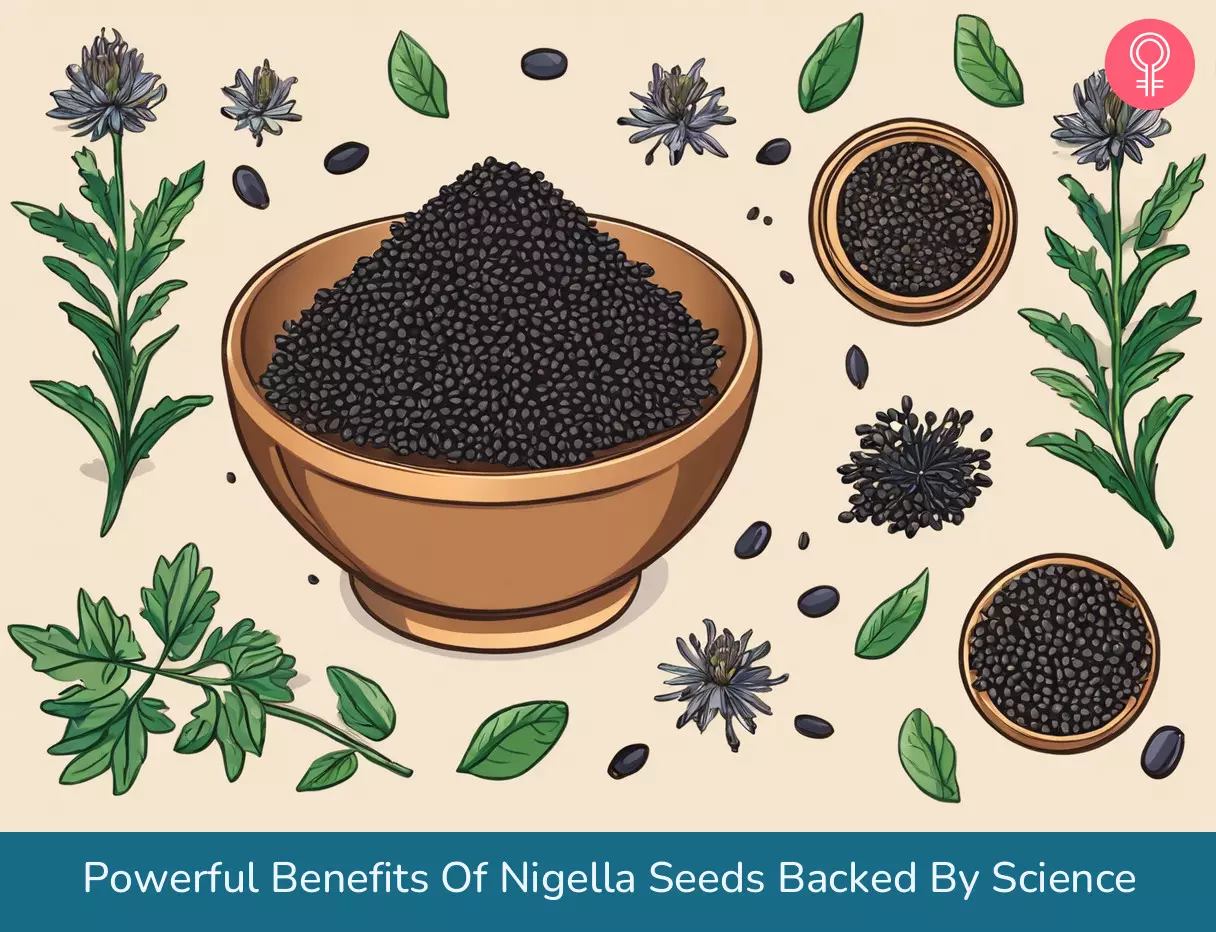
Image: Stable Diffusion/StyleCraze Design Team
Discover the amazing healing powers of Kalonji seeds! Learn how these tiny seeds can help heal our bodies in 5 incredible ways. Check out the video below to know more.
Personal Experience: Source
StyleCraze's articles are interwoven with authentic personal narratives that provide depth and resonance to our content. Below are the sources of the personal accounts referenced in this article.
i. The Benefits Of Black Seed Oil In Controlling Symptoms Of Various Health Conditions, Chronic Illnesses And Pain.https://riveraville.wordpress.com/2019/01/03/the-benefits-of-black-seed-oil-in-controlling-symptoms-of-various-conditions-chronic-illnesses-and-pain/
References
Articles on StyleCraze are backed by verified information from peer-reviewed and academic research papers, reputed organizations, research institutions, and medical associations to ensure accuracy and relevance. Read our editorial policy to learn more.
- “Thymoquinone: an emerging natural drug with…”. Iranian Journal of Basic Medical Sciences, US National Library of Medicine.
- “Thymoquinone: potential cure for inflammatory…”. Biochemical Pharmacology, US National Library of Medicine.
- “Chemical composition of Nigella sativa…”. Journal of Food Science and Technology, US National Library of Medicine.
- “Black cumin (Nigella sativa) and its…”. Iranian Journal of Basic Medical Sciences, US National Library of Medicine.
- “Nigella sativa (black seed) effects on plasma…”. Pharmacological Research, US National Library of Medicine.
- “Nigella sativa thymoquinone-rich fraction…”. Free Radical Biology & Medicine, US National Library of Medicine.
- “Efficacy of Nigella sativa in serum free…”. Acta Medica Indonesiana, US National Library of Medicine.
- “Favorable impact of Nigella sativa seeds on…”. Journal of Family & Community Medicine, US National Library of Medicine.
- “The effects of Nigella sativa L. on…”. Journal of Ethnopharmacology, US National Library of Medicine.
- “Mitigation of obesity-promoted diseases…”. Plant Foods for Human Nutrition, US National Library of Medicine.
- “Cancer chemopreventive potential of volatile oil…”. Oncology Letters, US National Library of Medicine.
- “Inhibition of two stage renal carcinogenesis…”. European Journal of Cancer Prevention, US National Library of Medicine.
- “Thymoquinone extracted from black seed triggers…”. International Journal of Oncology, US National Library of Medicine.
- “Anticancer activities of Nigella…”. African Journal of Traditional, Complementary, and Alternative Medicines, US National Library of Medicine.
- “Recent advances on the anti-cancer properties…”. Journal of Ayurveda and Integral Medicine, US National Library of Medicine.
- “Effect of nigella sativa seeds on the…”. Indian Journal of Physiology and Pharmacology, US National Library of Medicine.
- “Nigella sativa improves glucose homeostasis…”. Complementary Therapies in Medicine, US National Library of Medicine.
- “Effects of Nigella sativa supplementation…”. Journal of Research in Medical Sciences, US National Library of Medicine.
- “Elevated glycated hemoglobin levels may…”. International Journal of Clinical and Experimental Medicine, US National Library of Medicine.
- “Antihypertensive effect of Nigella sativa…”. Fundamental & Clinical Pharmacology, US National Library of Medicine.
- “Mechanisms in the antihypertensive effects of…”. Clinics, US National Library of Medicine.
- “Diuretic and hypotensive effects of Nigella…”. Thérapie, US National Library of Medicine.
- “Anti-inflammatory effects of the Nigella…”. The official journal of the International Hepato Pancreato Biliary Association, US National Library of Medicine.
- “The effect of Nigella sativa on inflammation…”. Research in Pharmaceutical Sciences, US National Library of Medicine.
- “Effect of topical application of Nigella…”. Electronic Physician, US National Library of Medicine.
- “Effects of thymoquinone on rheumatoid…”. Phytotherapy Research, US National Library of Medicine.
- “Effects of black cumin seeds on…”. The Veterinary Quarterly, US National Library of Medicine.
- “Nigella sativa supplementation improves asthma…”. Phytotherapy Research, US National Library of Medicine.
- “Antibacterial activity of Nigella sativa against…”. Journal of Ayub Medical College, Abbottabad, US National Library of Medicine.
- “Anti-microbial effect of Nigella sativa seed…”. Medical journal of the Islamic Republic of Iran, US National Library of Medicine.
- “The protective effect of Nigella sativa against liver…”. Iranian Journal of Basic Medical Sciences, US National Library of Medicine.
- “The effect of Nigella sativa oil against the liver damage…”. Journal of Ethnopharmacology, US National Library of Medicine.
- “Renal injury, nephrolithiasis and nigella…”. Avicenna Journal of Phytomedicine, US National Library of Medicine.
- “Effects of black seeds on male infertility”. Journal of Herbal Medicine, ScienceDirect.
- “The use of nigella sativa as a single agent…”. ResearchGate.
- “Effects of Nigella sativa L. seed oil on…”. Phytomedicine, US National Library of Medicine.
- “Dermatological effects of Nigella sativa”. Journal of Dermatology & Dermatologic Surgery, ScienceDirect.
- “Novel antifungal defensins from Nigella…”. Plant physiology and biochemistry, US National Library of Medicine.
- “A Review on the Cosmeceutical…”. Japanese Journal of Tropical Medicine and Hygiene, US National Library of Medicine.
- “Safety classification of herbal medicines used…”. BMC Complementary & Alternative Medicine, US National Library of Medicine.
- “Thymoquinone modulates blood coagulation…”. International Journal of Molecular Sciences, US National Library of Medicine.
Read full bio of Heather M. Duquette-Wolf
Read full bio of Arshiya Syeda
Read full bio of Sindhu Koganti






